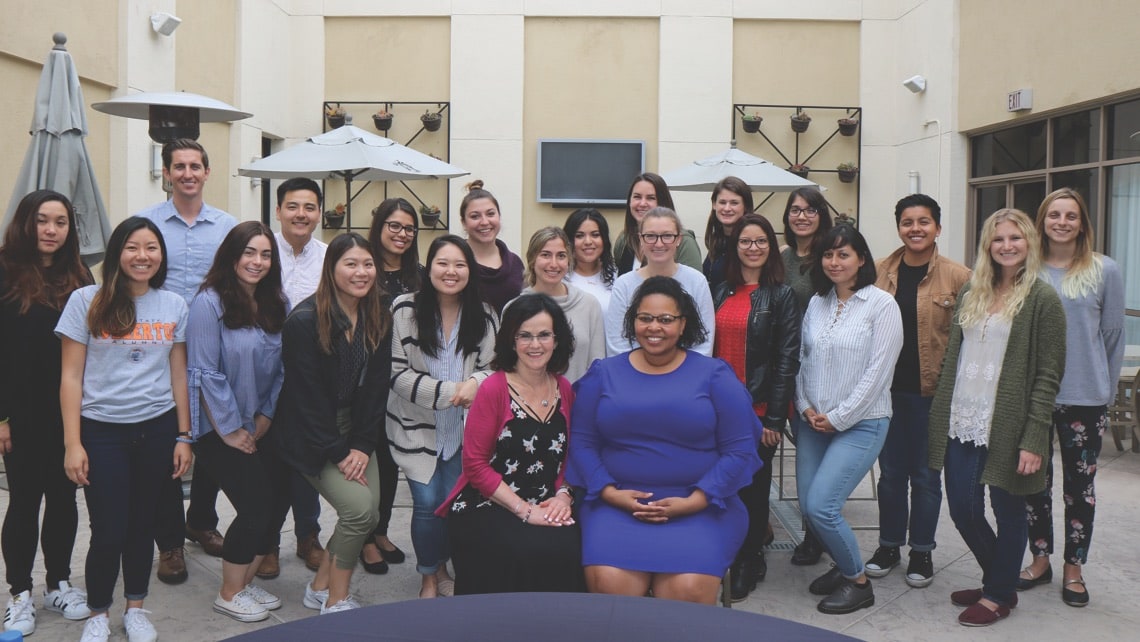Supporting teacher educators to train new teachers to disrupt inequity
What would a laboratory class look like if the students enrolled in the class were teacher candidates instead of rising fifth-graders? Teacher educators in the California State University (CSU) Methods Course Fellowship program had a chance to find out.
Launched in 2017, the CSU Methods Course Fellowship is a partnership between TeachingWorks and the CSU system to support the development of practice-based approaches in elementary mathematics and English language arts (ELA) methods courses on eight CSU campuses.
With a grant from the S. D. Bechtel, Jr. Foundation, TeachingWorks worked directly with six instructors who train teacher candidates in mathematics from five CSU campuses during the 2017–2018 academic year to design a curriculum unit to use in their courses. During the semester when they were teaching the unit, TeachingWorks supported the instructors with coaching, feedback, and resources. The goal of the work was for methods instructors to learn how to work deliberately on disrupting inequity by integrating the high-leverage practices with mathematical content.
Because CSU’s teacher preparation programs prepare 10 percent of the nation’s teachers, it is a crucial partnership state for TeachingWorks to advance skillful teaching.
“The children who go to school in California represent a huge proportion of the changing population of the United States,” said TeachingWorks Director Deborah Loewenberg Ball. “Being in a context where we are working with teacher educators who are preparing teachers who are not only members of those communities themselves but who are also teaching children from those communities is an important part of our mission to ensure that children in this country have regular access to skillful teaching.”
This year, with a second grant from the S. D. Bechtel, Jr. Foundation, the partnership expanded to include six English language arts methods course instructors within the CSU system, as well as additional mathematics methods course instructors. But this year, Ball said, TeachingWorks wanted to adjust the partnership to better fit the needs of participants. “We found that the fellows were really excited about being able to work on content, teaching practice, and equity all together, but they were also concerned about the things they would have to cut from their syllabi,” she said. “We realized this year that we needed to find a way to show participants how they could better structure their curricula to layer in content, practices, and advancing justice.”
“We realized this year that we needed to find a way to show participants how they could better structure their curricula to layer together content, practices, and advancing justice.” Deborah Loewenberg Ball, Director, TeachingWorks
The solution was a three-day laboratory class held at the CSU-Fullerton campus. While members of the TeachingWorks team taught a mathematics methods course to 20 teacher candidates from the CSU-Fullerton campus, fellows in the partnership, as well as stakeholders from the entire CSU system, observed the class to see first-hand how to integrate mathematical content, the high-leverage practices, and attention to equity within teacher education. In afternoon professional development sessions, fellows worked with the TeachingWorks instructional team to unpack each day’s lesson, highlighting the specific pedagogical moves that opened opportunities for novices to practice teaching toward the disruption of inequity.
“When issues of race and equity are dealt with in teacher education, it is often in a separate course like multicultural education or structural racism,” said Ball. “The laboratory class and professional development sessions were designed to demonstrate how teacher educators can interrupt that pattern in their courses. We were really focused on helping teacher educators see and understand specific moves and practices, like hearing students’ strengths, or acknowledging children’s mathematical ideas, that they can teach their teacher candidates to use in the context of their content to enable them to interrupt inequitable patterns that persist in classrooms.”
For Jesus Esquibel, a fellow in the partnership from CSU-Bakersfield, the laboratory class was insightful, and enabled him to walk away with concrete ways to better support his beginning teachers. “The lab class allowed teacher candidates to see some of the different ways they can build community in the classroom to disrupt inequities,” he said. “I saw teaching moves like learning student names and validating student responses not only being discussed, but also properly modeled for teacher candidates.”
Throughout the remainder of the year, fellows in the program will continue to receive support from TeachingWorks in designing new units to implement in their courses. TeachingWorks aims to provide fellows with opportunities to collaborate with each other across campuses. “We hope that this is a strategy to help build more strength and cohesiveness amongst the teacher educators on the campuses,” Ball said. “It’s important to build a professional community of teacher educators in the same ways that are true for classroom teachers. We want this work to push back on the pattern of education faculty working on their own and to build more of a habit of conferring with one another.”



